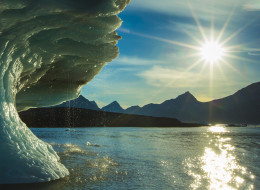 Three Colorado cities voted Tuesday to ban fracking, the kind of test that might be coming to states from California to North Carolina as oil and gas drilling surges from coast to coast.
Three Colorado cities voted Tuesday to ban fracking, the kind of test that might be coming to states from California to North Carolina as oil and gas drilling surges from coast to coast.
The Colorado vote, happening in a state with a long history of energy development, was a trial of whether the oil and gas industry could overcome passionate opposition to the drilling practice that’s helped create an American energy boom.
Colorado cities’ fracking bans could be canary in a coalmine
Tsunami debris to wash onto US shores over next few years
 Debris from the deadly tsunami that struck Japan in 2011 has been floating in the Pacific Ocean and will likely wash onto North American shores over the next few years, according to the U.S. National Oceanic and Atmospheric Administration (NOAA).
Debris from the deadly tsunami that struck Japan in 2011 has been floating in the Pacific Ocean and will likely wash onto North American shores over the next few years, according to the U.S. National Oceanic and Atmospheric Administration (NOAA).
"A significant amount of debris has already arrived on U.S. and Canadian shores, and it will likely continue arriving in the same scattered way over the next several years," NOAA officials said in a statement.
Moratorium on fracking announced by Newfoundland government
 Dalley started off the fall sitting in the House of Assembly by announcing that the government will not approve fracking onshore and onshore-to-offshore hydraulic fracturing pending further review.
Dalley started off the fall sitting in the House of Assembly by announcing that the government will not approve fracking onshore and onshore-to-offshore hydraulic fracturing pending further review.
Dalley said the government will be doing public consultation before it develops any policy for fracking. Both the Liberals and the NDP are supporting the move.
Dalley said this moratorium will allow an opportunity to review regulations, rules and guidelines in other jurisdictions, to complete the technical work necessary to fully assess the geological impact in western Newfoundland and, following this process, to undertake public consultation to ensure residents have an opportunity to comment and are fully informed before any decision is made.
Climate Change Report Sees Violent, Sicker, Poorer Future
WASHINGTON -- WASHINGTON (AP) — A leaked draft of an international scientific report forecasts that man-made global warming likely will worsen already existing human tragedies of war, starvation, poverty, flooding, extreme weather and disease.
The Nobel Peace Prize-winning Intergovernmental Panel on Climate Change will issue a report next March on how global warming is already affecting the way people live and what will happen in the future, including a worldwide drop in income. A leaked copy of a draft of the report's summary appeared online Friday.
Pacific Ocean warming 15 times faster than before
 In a study out today in the journal Science, researchers say that the middle depths of a part of the Pacific Ocean have warmed 15 times faster in the past 60 years than they did during the previous 10,000 years.
In a study out today in the journal Science, researchers say that the middle depths of a part of the Pacific Ocean have warmed 15 times faster in the past 60 years than they did during the previous 10,000 years.
Most of the heat that humanity has put into the atmosphere since the 1970s from greenhouse gas emissions has likely been absorbed by the oceans, according to the most recent report from the Intergovernmental Panel on Climate Change, a United Nations-sponsored group of scientists that issues reports every few years about the effects of global warming.
More Than 15 Million Americans Now Live Within One Mile Of A Fracking Well
The natural gas boom has led to an “unprecedented industrialization” of many Americans’ backyards, an analysis from the Wall Street Journal has found.
The WSJ looked at census and natural gas well data from more than 700 counties in 11 major natural-gas producing states, and found that at least 15.3 million Americans have a natural gas well within one mile of their home that has been drilled since 2000. That’s more than the population of Michigan or New York.
North Dakota failed to inform the public of 100s of oil spills over last two years
 North Dakota, which ranks second in the US in terms of oil production, endured almost 300 oil spills in under two years and yet managed to avoid reporting a single one of them to the public, according to a new report.
North Dakota, which ranks second in the US in terms of oil production, endured almost 300 oil spills in under two years and yet managed to avoid reporting a single one of them to the public, according to a new report.
Documents viewed by the Associated Press indicate that, since January 2012, as many as 750 “oil field incidents” were recorded in North Dakota. The distinction between spills and incidents was not immediately clear but presumably was related to the magnitude of the accident.
Keystone XL Contractor's Potential Conflicts Of Interest Not Mentioned In State Department Documents
State Department documents released to an environmental group are raising new questions about the hiring of a government contractor to evaluate environmental impacts of the proposed Keystone XL pipeline.
Environmental Resources Management has conflicts of interest that should have prevented it from winning the contract for the analysis of the controversial pipeline, which would carry oil from Canada's oil sands to the U.S. Gulf Coast, the Sierra Club has said. The group filed a Freedom of Information Act request with the State Department seeking documents that would show how Environmental Resources Management was chosen. Sierra Club provided some of the documents it received to The Huffington Post.
Arctic Temperatures Highest in at Least 44,000 Years
 Plenty of studies have shown that the Arctic is warming and that the ice caps are melting, but how does it compare to the past, and how serious is it?
Plenty of studies have shown that the Arctic is warming and that the ice caps are melting, but how does it compare to the past, and how serious is it?
New research shows that average summer temperatures in the Canadian Arctic over the last century are the highest in the last 44,000 years, and perhaps the highest in 120,000 years.
"The key piece here is just how unprecedented the warming of Arctic Canada is," Gifford Miller, a researcher at the University of Colorado, Boulder, said in a joint statement from the school and the publisher of the journal Geophysical Researcher Letters, in which the study by Miller and his colleagues was published online this week. "This study really says the warming we are seeing is outside any kind of known natural variability, and it has to be due to increased greenhouse gases in the atmosphere."
More Articles...
Page 43 of 157

 Environmental News Archive
Environmental News Archive


































